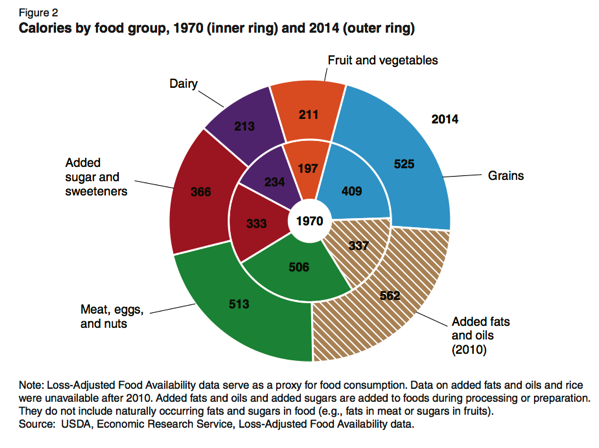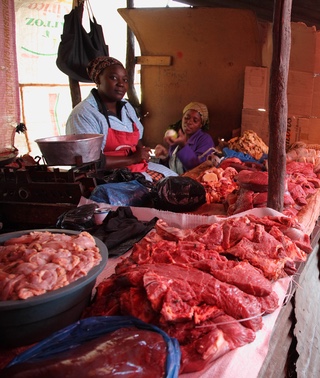“[C]alories from all food groups increased, fats and oils and the meat group most of all, dairy and fruits and vegetables the least.”
Marion Nestle describes this diagram as “my favourite figure”.

I hope she’s joking, because I can’t make head nor tail of it. ((Well, I can, but only with considerable effort.))
It’s from a USDA publication on U.S. Trends in Food Availability and a Dietary Assessment of Loss-Adjusted Food Availability, 1970-2014
Note, first, that the data are for food availability, which “serve as a proxy for food consumption”. So it’s measuring what’s there and saying all of it was eaten. Fair enough.
Inside the report are tables and graphs that are far more informative than that circular abomination — what are we even supposed to be comparing?
Marion Nestle concludes:
[C]alories from all food groups increased, fats and oils and the meat group most of all, dairy and fruits and vegetables the least.
While the report says:
Americans continue to fall short of the recommended amounts in USDA’s Dietary Guidelines for Americans for fruit, vegetables, whole grains, seafood, and dairy products, and their consumption continues to exceed the recommended amounts for total grains, some protein foods, saturated fat, and added sugars. In order to meet these recommendations, Americans would need to lower their consumption of added fats, refined grains, and added sugars and sweeteners, and to increase their consumption of vegetables, whole grains, dairy products, and fruit.
Go to it.


 Excluding animal products from your diet as a vegetarian or vegan is a choice some people have the luxury to make, and if they know what they’re doing, and take care, they can be perfectly healthy. But there are probably far more people who have no choice in the matter. They would eat meat if they could, but they simply can’t afford it. For those people, a little bit of animal source food – milk, meat, eggs – can make a great difference to their health and wellbeing. It can be easy to forget that, in the clamour for meatless Mondays and other efforts to respond to climate change. There’s also the fact that in many parts of the world, animals play a very useful role in transforming things people can’t or won’t eat, like grass, into good food.
Excluding animal products from your diet as a vegetarian or vegan is a choice some people have the luxury to make, and if they know what they’re doing, and take care, they can be perfectly healthy. But there are probably far more people who have no choice in the matter. They would eat meat if they could, but they simply can’t afford it. For those people, a little bit of animal source food – milk, meat, eggs – can make a great difference to their health and wellbeing. It can be easy to forget that, in the clamour for meatless Mondays and other efforts to respond to climate change. There’s also the fact that in many parts of the world, animals play a very useful role in transforming things people can’t or won’t eat, like grass, into good food.